Cost of living crisis: How rising prices are affecting people in Scotland
- Published
Gauging the summer cost of living
With holiday season in full swing, BBC Scotland's consumer affairs correspondent Connor Gillies has taken a trip of his own. He wanted to find out how people across the country are coping with the rising price of energy, food and fuel.

In four locations over four days, the phrase "cost of living" was greeted with a dreadfully familiar sigh from everyone we met.
From Millport on the Isle of Cumbrae, to the Kelpies in Falkirk, Pitlochry and Fort William, our journey showed that every community in Scotland has a unique experience of this crisis.
The Barclay family
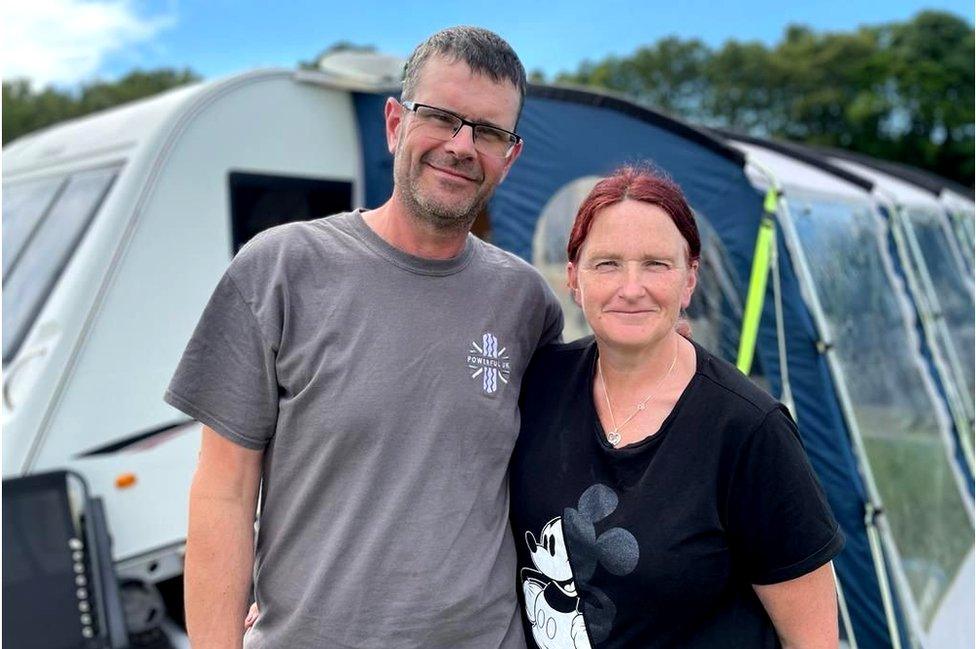
Gordon and Seonaide Barclay from Saltcoats, were on holiday in Pitlochry
I met Ayrshire couple Gordon and Seonaid Barclay at a caravan park in Pitlochry. They described the current price rises and the impact it is having on their lives as "horrible".
Seonaid said: "I shop around now and look for cheaper prices in different shops. Before I would do all my shopping in Asda, now I go around all different shops looking for cheaper prices.
"You go in and it used to be a dozen eggs for £1, now it's £1.25/ £1.30. I used to get my wee boy a tub of fruit that used to be a pound, now it's £1.50. That's a big jump."
Dad Gordon told me he uses price comparison websites for almost everything in life these days. It is all about saving every penny and pound possible.
The NHS worker said: "We are actually in a worse state now than we were after World War Two.
"Today's standards of living are going through the floor. You have today's society going to food banks which is disgusting."
The island struggle
There is no petrol station on the Clyde coast island of Cumbrae. It has a population of just over 1,000 people, but it is extremely popular with day trippers.
We heard the tale of the local electrician who has ditched his van because he can't afford to top up the fuel anymore.
A story echoed by the island's delivery driver who cut back his trips on the ferry to the mainland because the cost was mounting up. Locals don't get a discount on the eight minute Calmac crossing - meaning it's at least £15 to take the car on and off.
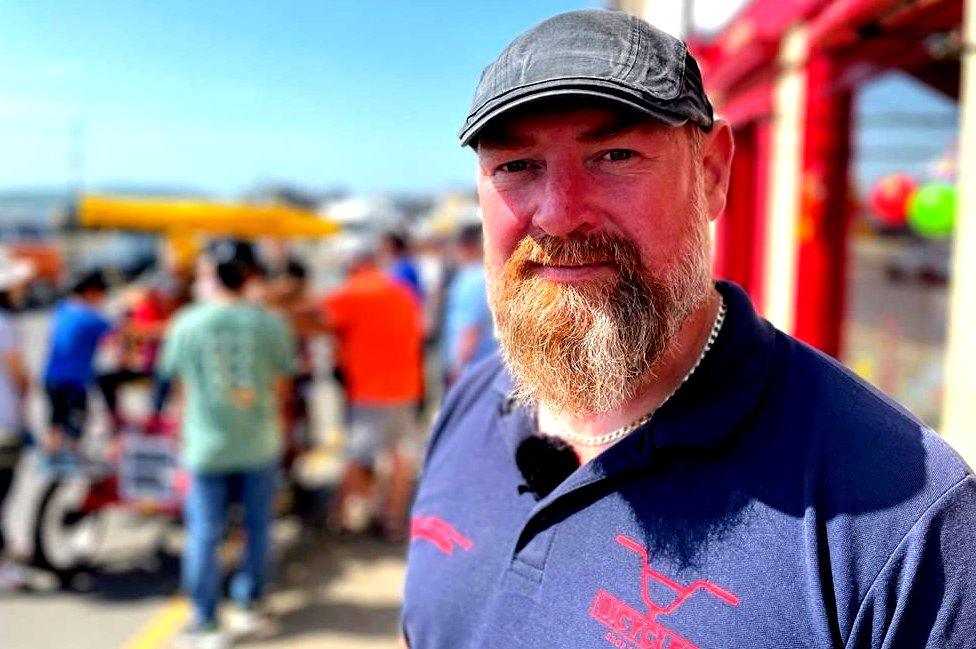
Scott Ferris owns a bike shop in Millport
Scott Ferris runs one of the local bike shops in Millport. He is doing a roaring trade as visitors come to the island especially to do the 10 mile circular loop.
A once affordable day trip is creeping up in cost. The price of hiring a bike is up as much as 15% as firms try to grapple with price rises.
Scott told us: "On a very sunny day we can do up to 300 bikes a day, up to 5,000 people will travel to the island on a good day.
"Prices have had to go up again from parts, staff, fuel, all those costs have raised in the last couple of years and any away-days for families becoming more and more expensive will make it a difficult choice for them to have to make - stay at home or go away spend money they potentially don't have."
'My business energy bills are £13k a week'
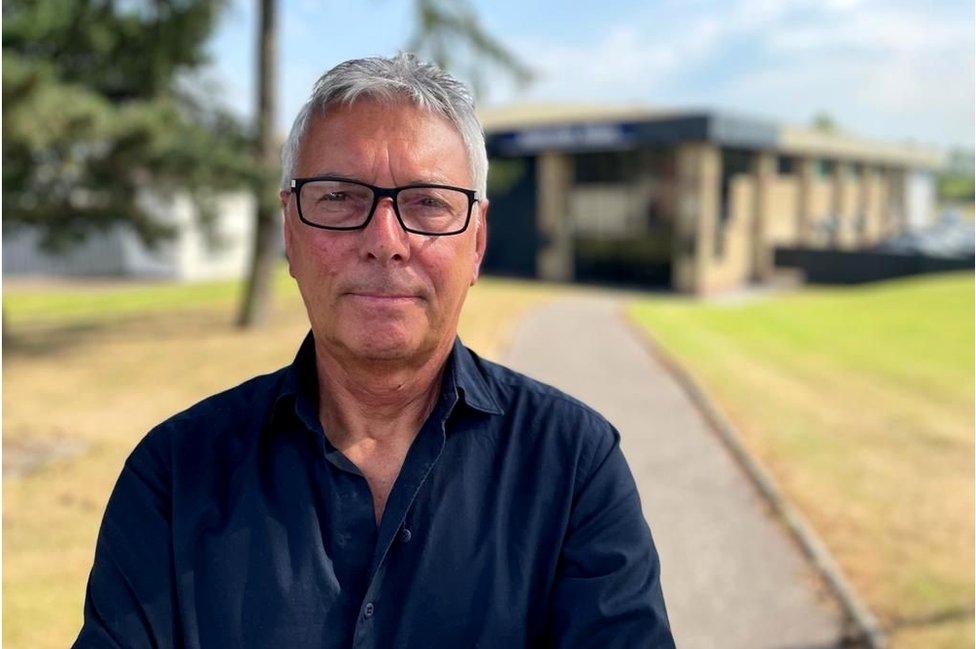
Gordon Allan of Falkirk butcher firm Malcolm Allan
Tucked away in an industrial estate in Larbert near Falkirk is the factory for Malcolm Allan butchers.
They are well known for their blue-boxed steak pies and Scottish cooked breakfast packs, which are found on the shelves of all major supermarkets.
I met boss Gordon Allan who gives a stark reminder that businesses aren't protected with an energy price cap like consumers.
He told me: "We were £6,500 a week for electricity, now we've gone to £13,500 and this week with the hot weather we are £15,000 for the week. It's bonkers. Everybody seems to be just burying their heads in the sand and thinking it will go away. It's not going away.
"We've changed all our working patterns, we work one factory two days a week, we work our bakery four days a week. We used to be seven days a week production."
Gordon's story of survival chimes with the reality facing many firms just now. A precarious financial situation means sacrifices along the way.
He continued: "We've looked at every aspect of our business from packaging - we'll stop putting all our steak pies in cardboard boxes from 1 August that will save some money.
"But why should we have to? I like my products in cardboard boxes, the customers like our products in cardboard boxes"
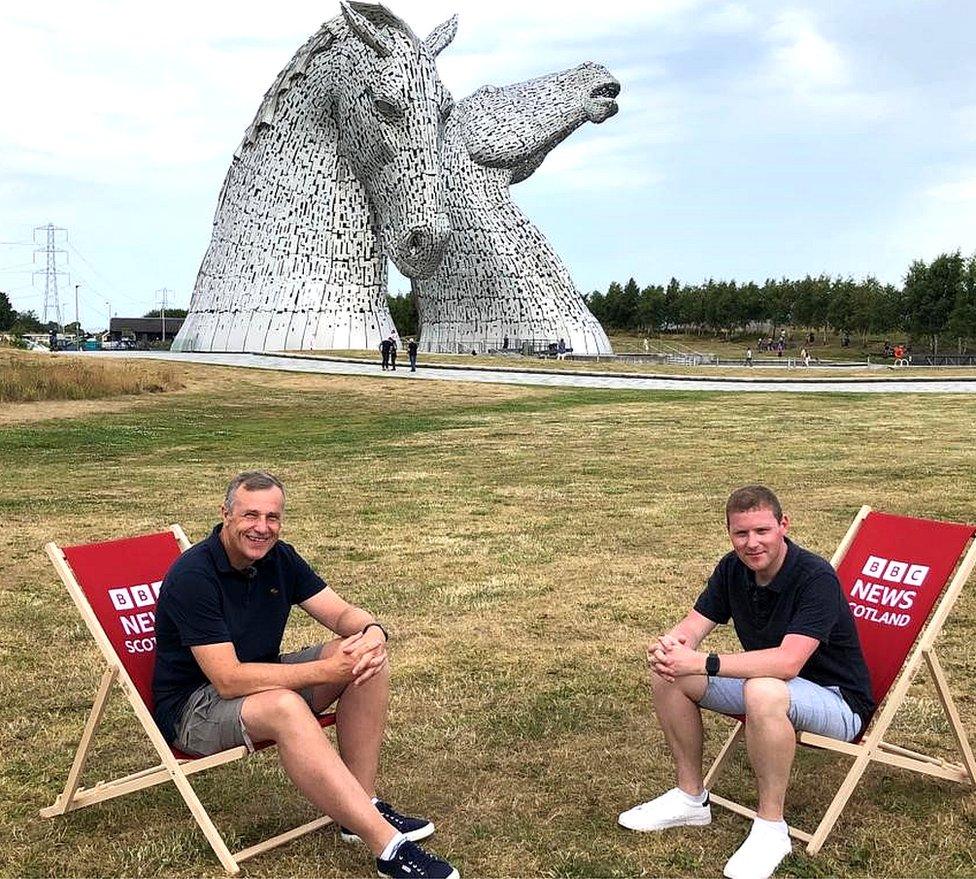
Frazer Scott from Energy Action Scotland speaks to Connor at The Kelpies
Along the road in the shadow of the Forth Valley's mighty Grangemouth oil refinery are the Kelpies and the Helix park. A place where families can enjoy a free day out at a time when budgets are restricted.
We set up our BBC Scotland News red deck chairs and encouraged people to pose their questions to expert Frazer Scott from the charity Energy Action Scotland.
The overriding thought was one of why are gas and electricity bills increasing so much? Others wanted Frazer to provide the best tips on cutting their energy usage to save where they could.
The shed to save cash
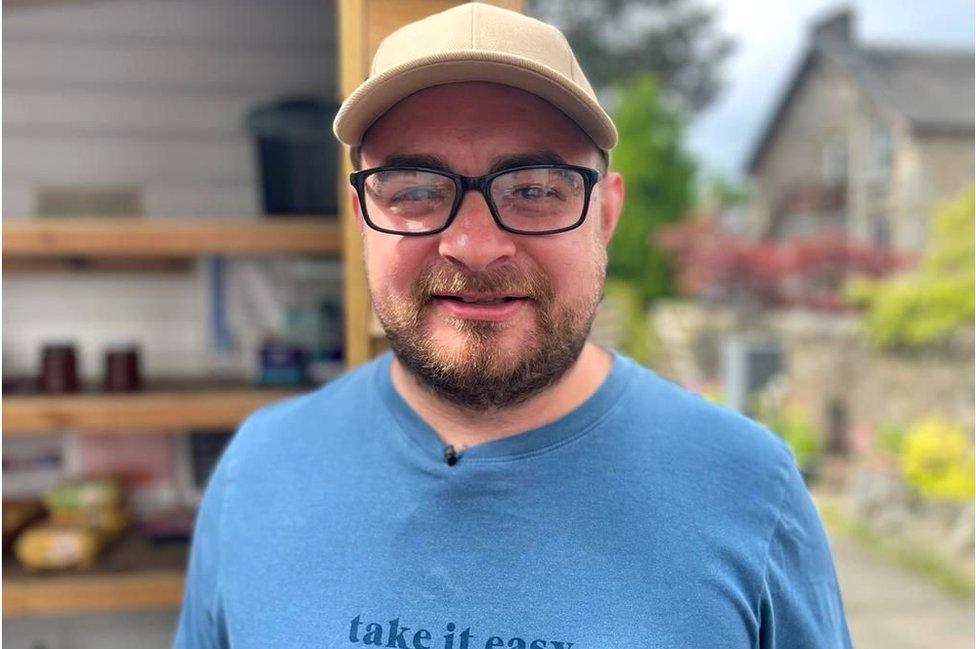
Alan Chilton donated a fajita kit and took some eggs from a community larder in Pitlochry
Outside the entrance to the Atholl Centre in Pitlochry is a shed with no door. It is known as the "community larder" where people can drop in 24 hours a day, seven days a week for free food.
There are shelves stacked with rolls, cakes, fruit and veg all coming towards their use-by dates. The local supermarket supplies the goods in the hope of cutting down on waste.
A quirky concept saving people, like Allan Chilton, money.
The 30-year-old, who relied heavily on this larder during lockdown when he lost his job, turned up with a fajita kit in his hands ready to donate for someone else to feel the benefit of.
He then picked up some eggs before heading up to the village to do his shopping. It saves him buying them.
The cost of living means people are trying to see how they can stretch out their money.
The changing tourist habits
Tourism is the lifeblood of the local economy in Fort William and across Lochaber. Jobs and livelihoods rely on it.
Locals told me they really struggled during the height of the pandemic when overseas visitors were banned from coming here.
It's a very different story now. The high street was an eclectic mix of foreign accents and the roads full of European number plates. Business is back.
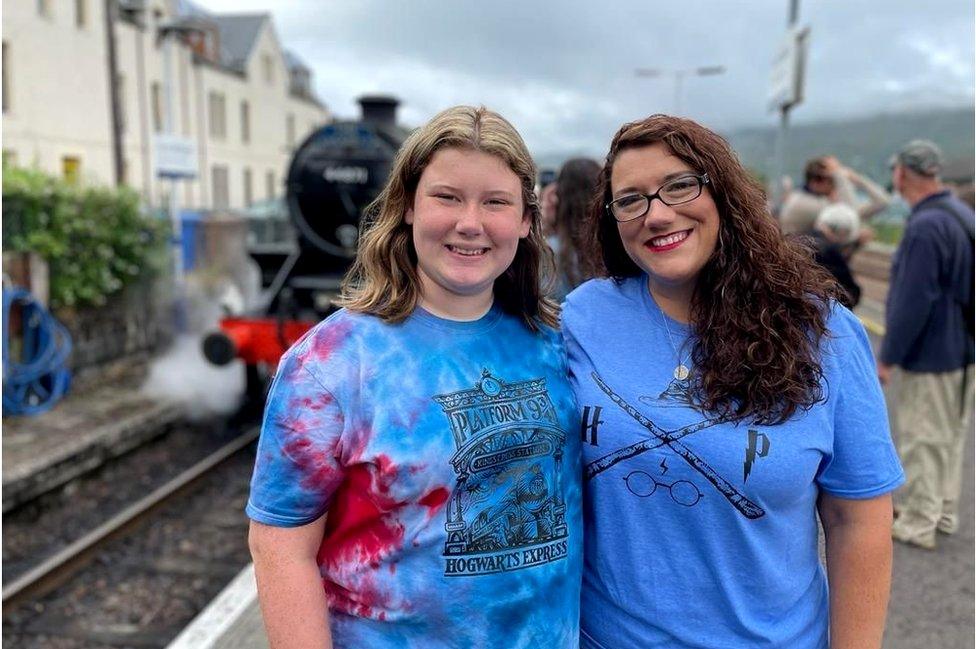
Sophie and Alicia Zieman, from Kentucky, were on holiday in Fort William
We went to the platform where the Jacobite Steam train was waiting to depart. A magnet for tourists who recognise the burgundy carriages and black-polished engine from the famous Harry Potter films.
I met Alicia Zieman and her daughter Sophie who had arrived this week from the US state of Kentucky.
She said "We will go out to eat in the restaurants here but not as much as we used to before.
"We are staying in a hotel here and the price has gone up. We were just talking about that with our cab driver on the way here"
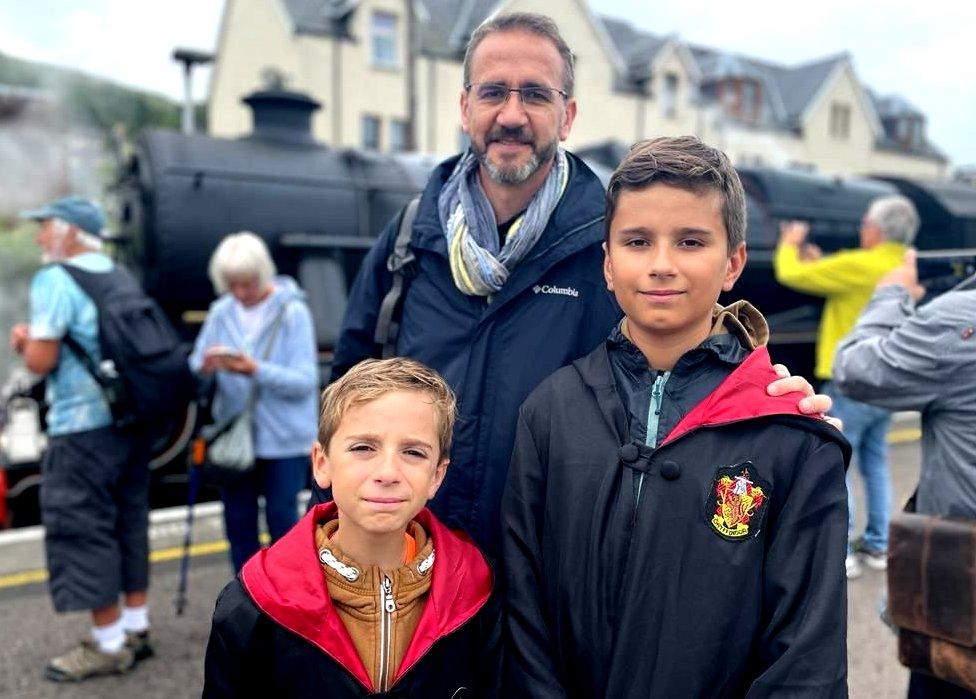
Mathieu, Etienne and Alban are making packed lunches rather than eating out at cafes
We also stumbled across French dad Mathieu Percot and his young sons Etienne and Alban, who were kitted out in their Hogwarts robes.
They told me how they now make packed lunches to save money rather than stopping in the local cafes. They visit budget supermarkets in Fort William in the morning for supplies whereas before they would have stopped for food in local places.
The Scottish Tourism Alliance recently reported half of its members suggesting consumer spending is down 50% on pre-pandemic levels.
An indication of changing habits on this financial journey which is no where near the end.


How are you dealing with the rising cost of living? You can let us know your tips and hacks for saving money on things like energy, food and transport. You can also send us any cost of living questions you want us to help answer.
In some cases your question will be published, displaying your name, age and location as you provide it, unless you state otherwise. Your contact details will never be published. Please ensure you have read the terms and conditions.
If you are reading this page on the BBC News app, you will need to visit the mobile version of the BBC website to submit your question on this topic.
Related topics
- Published30 June 2022
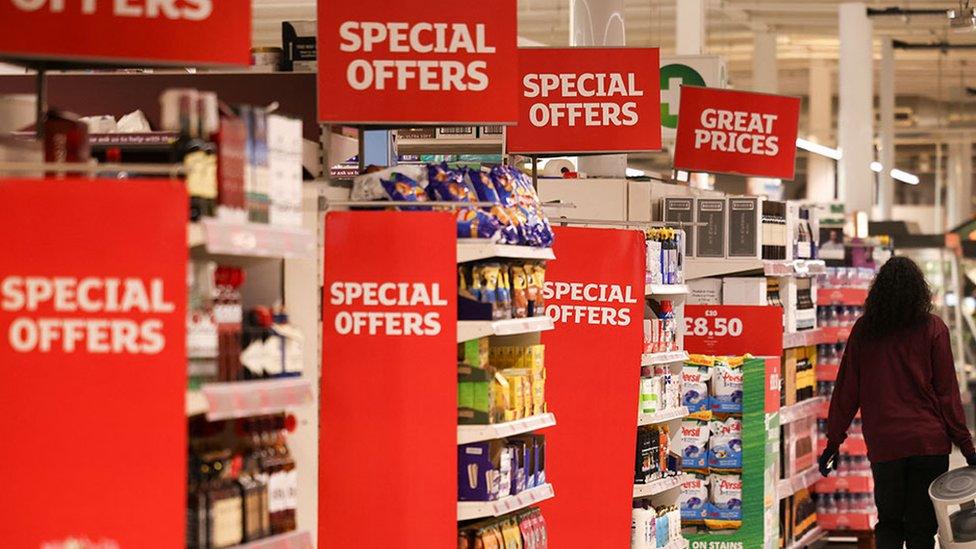
- Published17 June 2022

